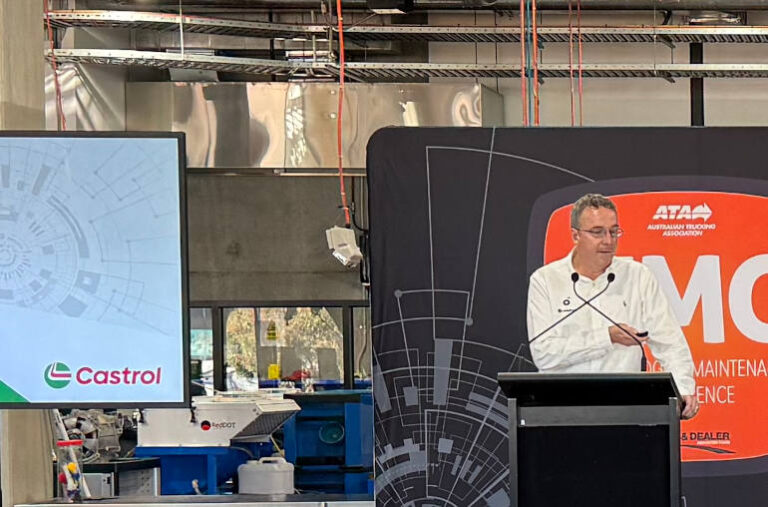At the 2024 Australian Trucking Association’s Technology and Maintenance Conference (TMC) in Melbourne, Ross Walker, Expert Technologist at Castrol, presented insights into trends in lubrication. His talk focused on the evolving balance between efficiency and wear protection, especially with the new generation of fuel-efficient oils.
The Evolution of Lubrication in the Trucking Sector
As Walker explained, driveline fluids play a crucial role in maintaining vehicle performance. These fluids are responsible for transmitting power from the engine to the drivetrain, affecting both speed and movement direction. Historically, the industry has relied on mineral-based oils, but there’s now a shift towards synthetic and fuel-efficient oils. These advancements aim to reduce emissions and improve fuel economy while still ensuring adequate wear protection for the machinery.
Walker outlined how the primary challenge in developing fuel-efficient oils lies in the balance of reduced viscosity and robust wear protection. Thinner oils typically improve fuel efficiency by reducing energy loss during operation. However, this reduction in viscosity can potentially compromise the lubrication’s protective qualities, making it essential for formulations to include advanced additives that maintain protection while achieving fuel efficiency.
New Generation Oils and Fuel Efficiency
Walker highlighted Castrol’s development of new driveline products that meet stringent OEM specifications while enhancing fuel economy. Key trends include the transition to thinner oils like SAE 65 and synthetic formulations that offer long drain intervals, even with lower viscosity. He pointed to the adoption of thinner oils such as 0W-8, which are increasingly common in modern engines, especially for hybrid applications.
Despite the clear fuel-saving benefits, Walker noted the difficulty in accurately measuring the fuel efficiency gains from these lower viscosity oils. Real-world applications can vary significantly, making it challenging to predict exact fuel savings across different fleets. However, laboratory testing and field trials have shown consistent benefits, including a 1-2% improvement in fuel efficiency in some cases.
Ensuring Wear Protection with Lower Viscosity Oils
Walker acknowledged the scepticism among fleet operators regarding the durability of thinner, more efficient oils. To ensure reliable wear protection, manufacturers must use advanced additives that prevent oxidation, maintain viscosity, and protect against boundary wear conditions. Castrol’s solutions have undergone rigorous testing, including SAE J2360 field trials, which require products to pass stringent evaluations to be approved for use in heavy-duty applications.
For example, Castrol’s Transmax DynaDrive Long Life was developed to meet these standards, offering wear protection over extended drain intervals without the need for fully synthetic formulations. This oil has achieved significant success in real-world applications, with up to 300,000 km drain intervals observed under optimal conditions.
OEM Specifications and Compliance
OEM specifications add complexity to oil formulations, with each manufacturer having unique requirements to address specific issues like steel corrosion, oxidation, or seal compatibility. Walker emphasised the importance of using oils that have been officially approved by the OEM, rather than those that are merely “suitable for” the specifications.
To meet these demands, Castrol employs extensive testing and certification processes. Walker explained that achieving SAE J2360 certification, for example, involves not only meeting initial test criteria but also conducting long-term field trials, some of which can span four years. This process ensures that the oil maintains performance throughout its lifespan, offering confidence to both manufacturers and fleet operators.
Used Oil Analysis and Consistency in Lab Testing
Walker also discussed the importance of used oil analysis (UOA) as part of a fleet’s maintenance strategy. This process involves sending samples to laboratories for testing, focusing on factors like wear metal content, oxidation, and viscosity. Proper UOA allows operators to identify potential issues before they lead to equipment failures.
However, Walker noted that inconsistencies can occur among different labs, with some reporting varying thresholds for wear metals, leading to confusion among fleet managers. Castrol addresses this issue by setting specific limits for each of its products and sharing these with labs to ensure consistent reporting. Nonetheless, he advised fleet managers to be aware of potential discrepancies and to communicate regularly with labs to clarify any anomalies in UOA results.
The Future of Lubrication Technology
Looking ahead, Walker predicted that the trend towards lower viscosity oils would continue as manufacturers and fleets seek greater efficiency and reduced emissions. The rise of electric trucks will also shape lubrication needs, potentially reducing demand for traditional oils but increasing the need for cooling and gearbox fluids tailored to electric drivetrains.
In response to a question from the audience, Walker underscored the need for regular recertification of oil products to maintain compliance. Even after initial approval, oils must be retested every five years to ensure they still meet evolving performance standards.
Walker’s presentation at the 2024 Technology and Maintenance Conference underscored the complexities of balancing fuel efficiency and wear protection in modern driveline oils. While the benefits of thinner, fuel-efficient oils are clear, they require significant technological advancements to maintain wear protection. Castrol’s ongoing work in this space aims to provide fleet operators with reliable, high-performance products that support the transition to more efficient, lower-emission transport.
As Walker summarised, “We all want that 1-2% fuel efficiency gain, but we need to achieve it without compromising the reliability and longevity of our vehicles.”






